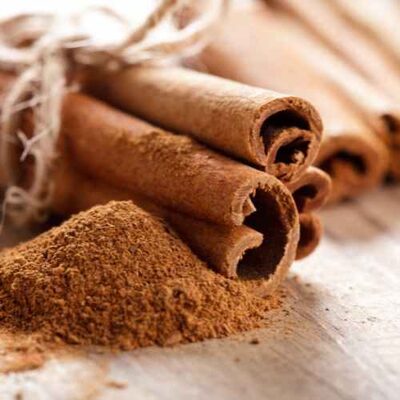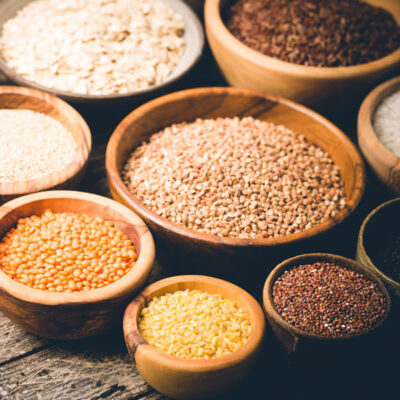The Versatility of Cinnamon Powder: From Kitchen to Medicine Cabinet
Author: admin Date Posted:6 November 2023

A vital aromatic in many of the world's cuisines. Cinnamon powder may already be a staple in your spice rack but have you ever considered how versatile this incredible spice truly is?
Cinnamon powder may already be a staple in your spice rack but have you ever considered how versatile this incredible spice truly is? Effortlessly switching from savoury to sweet, it is a key aromatic in many of the world's cuisines. But beyond its use in the kitchen, did you know that cinnamon also has some serious health creds? Read on as we take a trip through the world of cinnamon, its origins, uses, and of course its impressive health benefits.
All About Cinnamon
Cinnamon, known for its warm, sweet flavour and comforting scent, is derived from the inner bark of trees from the Cinnamomum family. The bark, once harvested, is dried and curled into what are commonly known as cinnamon sticks. These can be used whole or ground into a fine powder.
Where does cinnamon come from?
Cinnamon is native to Sri Lanka, formerly known as Ceylon. Not exclusive to Sri Lanka, it is also grown in other countries with a tropical climate, including India, Bangladesh, and Indonesia. The method of harvesting and processing cinnamon can differ slightly from one region to another, and they all have slightly different characteristics.
What is true cinnamon?
Ceylon cinnamon is also known as true cinnamon. Native to Sri Lanka, this variety is considered to be of higher quality and has a more delicate and complex flavour than the harsher cassia cinnamon. Ceylon cinnamon is lighter in colour and has a finer texture, and its sticks are made up of thin, papery layers that easily crumble into fragments. When you hear the term 'true cinnamon,' it refers to this superior variety from Sri Lanka, the Ceylon cinnamon.
What is Dutch cinnamon?
Dutch cinnamon is another name for the aforementioned cassia cinnamon. This variant has a sweet yet pungent flavour, which is far less delicate than Ceylon cinnamon. While it shares similar health benefits with the Ceylon variety, Dutch cinnamon has a higher concentration of the compound coumarin, which can be harmful in large quantities. It owes its name to its popularity in Dutch cooking where it adds a distinctive flavour to dishes such as Speculaas cookies and Dutch apple pie.
Our organic cinnamon powder is ground from the finest Ceylon cinnamon
The historical use of cinnamon
The use of cinnamon can be traced back to ancient civilizations. It was revered by the ancient Egyptians, who used it in their embalming process. In the Bible, it is mentioned multiple times as an ingredient in anointing oil. During the Middle Ages, cinnamon was a status symbol in Europe, its cost and scarcity made it a luxury item only the wealthy could afford. The demand for cinnamon was a driving force in world exploration as European explorers sought alternative routes to the spice-producing countries. Spices such as cinnamon played a massive role in the shaping of our culinary, and indeed political, history.
Cooking With Cinnamon
Way more than just the spice in your apple pie, or the welcome scent of your seasonal pumpkin spice latte, cinnamon powder is as useful in savoury dishes as it is in sweet. It finds its way into a surprising number of savoury stews and is quite often that elusive element that you just can't put your finger on. In fact, when used with a gentle touch, most spices can be used as a subtle edge of seasoning rather than a predominant note.
Cinnamon in sweet dishes
In sweet dishes, the warm, aromatic flavour of cinnamon just screams comfort. Its spicy yet sweet profile makes it a perfect pairing for baked goods such as muffins, cinnamon rolls, and apple pie, adding an element of interest and a note of familiarity.
Cinnamon powder can actually be used to create an illusion of sweetness and is often used by diabetics or those wishing to eliminate or cut down on sugar. Whilst not particularly sweet, it seems to have such associations with sugar that we believe the food we are eating is sweet. Try a sprinkle on your porridge or overnight oats in place of sugar.
Cinnamon in savoury dishes
In savoury dishes, cinnamon adds a complex depth of flavour that is both exotic and comforting. It's commonly used in Middle Eastern and Indian cuisines, adding a warm, spicy note to stews, curries, and meat dishes. Did you know that a pinch of cinnamon can also balance out the acidity in tomato-based dishes? When used sparingly, it harmoniously blends with other spices, enhancing the overall flavour profile of the dish without being overpowering.
Cinnamon in drinks
Next time you order your morning cappuccino ask for a shake of cinnamon instead of the usual chocolate. Hot chocolate tastes great with a touch of cinnamon too.
Its sweet-spicy undertones make cinnamon a popular choice in warm drinks like chai tea or mulled wine. Its comforting aroma makes a cup of hot cinnamon tea the perfect companion on a chilly day. In wellness drinks, cinnamon is often paired with ingredients like turmeric and ginger for a healthful boost.
The Health Benefits of Cinnamon
Cinnamon is also packed with beneficial nutrients that can do wonders for your well-being. From its antioxidant capabilities to its role in regulating blood sugar levels, cinnamon's health benefits are widely acknowledged. Let's look at some of the ways this fragrant spice can contribute to your overall health.
Anti-inflammatory and antioxidant
Cinnamon earns its super-spice status from its potent antioxidant and anti-inflammatory properties. Rich in polyphenols and flavonoids, it is one of the top-scoring ingredients on the antioxidant scale. These antioxidants work to neutralize harmful free radicals in the body, thereby reducing oxidative stress.
Chronic inflammation, when chronic is thought to be a major contributing factor in numerous health issues from heart disease to autoimmune disorders. The anti-inflammatory properties of cinnamon can help combat this inflammation, reducing the risk of these disorders and promoting overall health.
Blood sugar control
Cinnamon has been shown to play a significant role in regulating blood sugar levels, making it an ideal spice for people with type 2 diabetes or those who are pre-diabetic. The active compound in cinnamon, cinnamaldehyde, helps to stimulate insulin receptors in cells and improves their ability to use glucose. This process effectively lowers blood sugar levels and reduces the risk of developing complications related to diabetes.
This effect on blood glucose levels is not just immediate but can be sustained over time, making it a great addition to a balanced diet aimed at maintaining healthy blood sugar levels.
Potential for improving heart health
Cinnamon is said to also help normalise levels of triglycerides in the blood, which are a type of fat linked to heart disease and stroke. Studies have also shown that cinnamon can help lower "bad" LDL cholesterol levels while increasing "good" HDL cholesterol levels. This combination of effects on blood sugar, triglycerides, and cholesterol makes it an excellent spice for promoting heart health.
Anti-microbial properties
Cinnamon has been used as a natural remedy for various infections and illnesses for centuries. This is because it contains compounds with anti-microbial properties, which can help fight off harmful bacteria, viruses, and fungi. Again, this is down to the compound cinnamaldehyde, which has been shown to have powerful anti-bacterial and anti-fungal effects.
Contributes to dental health
Cinnamon plays a remarkable role in maintaining dental health as well. It's commonly used in many dental care products like toothpaste and mouthwash due to its strong antibacterial properties. The key compound, cinnamaldehyde, aids in combating oral microorganisms that can cause tooth decay and gum disease. Also, its breath-freshening qualities help to combat halitosis, commonly known as bad breath. So, along with a good dental hygiene routine, including cinnamon in your diet could contribute to a healthier and happier smile!
How to Incorporate More Cinnamon into Your Diet
Here are some creative and tasty ways to incorporate more cinnamon into your daily meals:
- Sprinkle on your breakfast: Add a dash of cinnamon to your morning oatmeal, yoghurt, or smoothies for a flavour boost.
- Spice up your coffee: Mix a little cinnamon into your coffee grounds before brewing for a delicious and aromatic twist.
- Season your fruits: Dust some cinnamon onto fresh fruits like apples or bananas for a healthy and satisfying snack.
- Revamp your baked goods: Add cinnamon to muffins, breads, cookies, or pancakes to enhance their flavour.
- Enhance savoury dishes: Cinnamon can also be used in savoury dishes such as curries, roasted vegetables, or stews.
- Stir into hot drinks: Mix cinnamon into hot chocolate or herbal teas for a soothing beverage.
- Boost your protein shake: Add a pinch of cinnamon to your post-workout protein shake for additional health benefits.
Precautions when using cinnamon in the diet
While cinnamon offers numerous health benefits, certain precautions should be taken when incorporating it into your diet.
Firstly, cinnamon contains coumarin, a natural substance that can cause liver damage if consumed in large amounts. This is especially true for Cassia cinnamon, which has higher coumarin levels than the Ceylon variety. Additionally, some people may experience allergic reactions to cinnamon, such as skin irritation, mouth sores, or respiratory symptoms. Also, due to its effects on blood sugar, individuals with diabetes should monitor their blood sugar levels closely when consuming cinnamon. Lastly, pregnant women are advised to consume cinnamon in moderation as excessive intake can lead to certain complications. As always, it's recommended to consult with a healthcare professional before making significant changes to your diet.
We have seen that cinnamon, with its rich history, culinary versatility in both sweet and savoury dishes, potential health benefits, and aromatic allure, truly embodies a spice that adds value far beyond the simple enhancement of flavour. We hope that this article encourages you to explore the world of cinnamon, both in your kitchen and for your health.
Why not also explore the rest of our organic ingredients and products?
Enjoyed this article? Find out more about why organic food goes way beyond just the butcher or the greengrocer.



